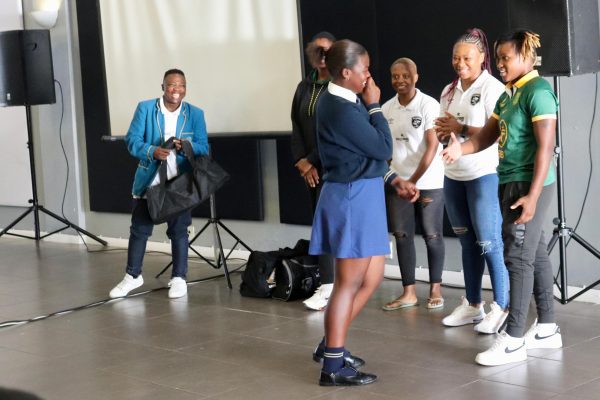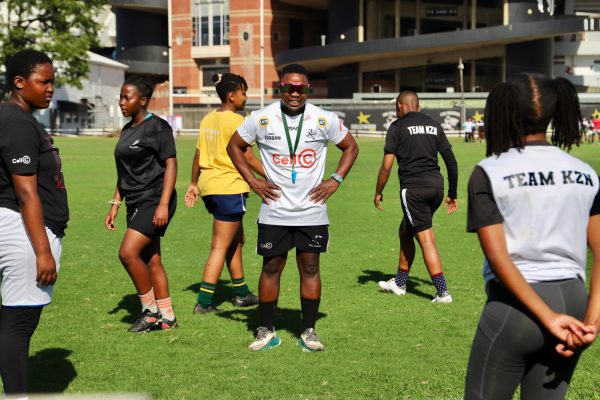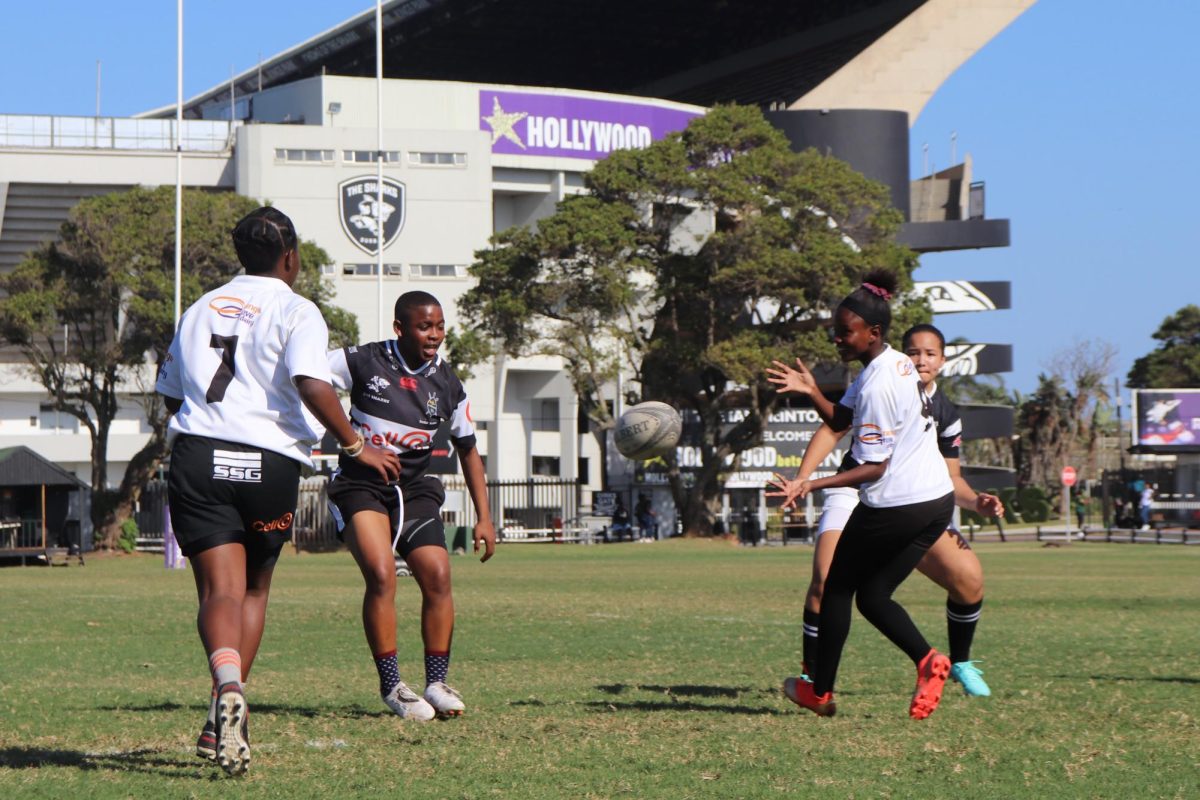Durban, South Africa – Forty-six athletes took a step towards a better future for women’s rugby June 23 at the Hollywoodbets Kings Park Stadium, home to the Durban Sharks, a professional rugby union team.
Inside the media room at the stadium, which seats 52,000 fans, the players participated in the Shark’s first official capping ceremony for girls on the Sharks’ under 16 (U16) and under 18 (U18) provincial teams.
“We just want to be recognized for our talents,” said Akhiwe Msomi, who plays flyhalf for Mowat Park High School. “Because in sports, it is not exactly equal. Girls’ sports are not really taken serious.”
In rugby, the honorific term “cap” or “capping ceremony” refers to the number of times a player has been selected to represent a specific team.
“The cap is showing that they recognize the value of what they’re doing,” said Xolandi Mthiyane, one of the parents in attendance. “It’s very important to recognize them and salute them.”

During the ceremony, the Sharks capped 23 athletes from various schools across the KwaZulu-Natal (KZN) province to make up the U16 and U18 teams. They will compete in the South Africa Rugby Girls Week tournament, a provincial rugby tournament held July 1 – 4 consisting of teams representing the nine provinces or regions that make up South Africa.
“It means a lot to me because I’m representing my team back home,” said Ndoniyethu Ngcobo, who attends Dabeka Secondary School and plays Lock and Number 8 for the girl’s U16 team.
In the world of South African rugby, women are often late to the sport, with fewer opportunities than men to play and sharpen their skills. The perception is that rugby is too rough for them.
“A lot of people told me it’s impossible, or that rugby is a male-dominated sport,” Msomi said.
Wandile Khumalo, a trans man who coaches the girls U16 team, has been rejecting that idea since he played for the South African National team.
“I’m a huge believer in equality,” Khumalo said. “Ideally, whatever happens for the boys can happen for the girls. That [capping ceremony] ticked one more thing off the list.”

Present during the ceremony were four South African women rugby stars who embody the athletes’ future visions of themselves: Mary Zulu, a fullback for the South African Women’s National Rugby team; Setty Dlamini, a member of the Sharks women’s squad and the women’s junior Springboks; and Nomonde Mbanjwa and Phatheka Dzanibe, who both play flanker for the Sharks women’s squad. Each of the athletes gave a small speech at the ceremony, encouraging the young athletes to dream big.
“I’m here today because I want to see you guys pay it forward,” Dzanibe told the girls. “I’m here to pay it forward to you guys for you to pay it forward to the next generation that are coming behind you.”
All of the professional players emphasized the magnitude of this opportunity to compete on the provincial level.
“Women’s rugby is on the rise,” Dzanibe told the girls. “It’s growing. You guys have been given that opportunity. You guys need to take that opportunity and use it wisely. It’s not a mistake that you guys are here. It could have been anyone. There are 100 girls that could have been here, but the coaches chose you. When you’ve been given that chance, take it and use it.”
For Risima Koza, a student at Mowat Park High School who plays prop for the U18 girls and is a former member of the U16 team, the message was well received.
“I saw how the women who came before me had to struggle so much so that we could be here and for us to have women’s rugby,” Koza said. “It motivated me so much. It gave me a drive to push because I know that there are women who went through so much. I also have to play my part in making the place where women’s rugby goes to. I also have to pave the way for other players coming after me.”
After the ceremony, the newly capped team members attended practice where they had time to work on both skills and team chemistry.
Khumalo, who ran the U16 practice after the ceremony in a field in front of the looming Sharks stadium, said he wants his players to understand the importance of leaning on others to achieve greatness, including on the current stars of today’s game.
“Nothing great was ever achieved singularly,” Khumalo said. “It’s always with the people. You can never achieve anything great on your own.”
Msomi and the other girls seemed to understand that as they hugged and shook hands with their idols.
“There is a future for girls’ rugby,” Msomi said. “Some of us who are capped here today show that anyone could do it with the right amount of pressure you put onto yourself at training and your commitment.”














































